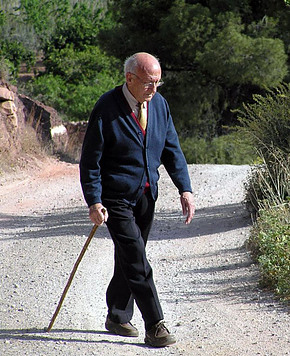Many elderly and seniors feel that they are too old to start exercising, they feel weak, tired or just too lazy to exercise regularly in the form of walking.
In fact, around 1 in 4 older people between the ages of 65 and 75 takes regular exercise with many people feeling that by walking regularly they are doing more damage to themselves than good.
Many of the elderly and seniors who do are unsure about how much walking they should be doing. So, how many steps should a 70 year old walk in a day ?
How many steps should a 70-year-old walk in a day ?
Answer snippet:
70-year-old – minimum of 3000 steps per day ( or walk for 20 to 30 minutes per day )
( aim for a brisk walking pace where it gets you a little breathless if you were to stop and talk) However, many experts agree that the recommended steps per day for the elderly and seniors is 7,000-10,000.
People who live with a chronic illness or disability can still benefit from walking regularly.
Walking guide for typical 70-year-old
Remember, this is a guide, some people are fit and healthy 70 year old, whilst others are deconditioned, weak with poor mobility and health problems.
It is recommended that you start slow and keep realistic goals that you can build towards. The key is to start slowly and build the amount you walk gradually. That way you won’t do any damage and you will keep motivated to continue.
What are the benefits of walking for the elderly ?
Exercise can help make you feel stronger, prevent bone loss, improve your coordination and balance and lessen the risk of falls.
It can improve your memory, make you feel mentally better, and help ease the symptoms of many chronic health conditions that affect the elderly.
- Great social activity
- Cheap and easy to do
- Boosts your mental health and wellbeing
- Improves your heart health ( reduced risk of heart disease and strokes )
- Reduces pain
- Lowers your blood pressure
- Reductions in blood glucose level
- Improve bone density
- Maintain flexibility
- Help you sleep better
Reasons why some older people stop exercising
1) Exercising will damage my joints
Walking is a great form of exercise for the elderly and seniors who suffer with arthritis. By walking, you are weight bearing through your joints, which helps strengthen your bones and lessens the risk of you developing osteoporosis and osteoarthritis.
It is also a great low impact way of exercising which won’t put too much pressure and strain through your hip, knee and ankle joints and keeps the joints flexible.
Regular walking will also help strengthen the muscles around your joints.
So what is the best supplement for aging joints ?
Glucosamine and chondroitin are part of normal cartilage, a connective tissue that helps cushion joints. They both play an important role in the formation and repair of cartilage. Both are often used as a treatment for osteoarthritis.
2) They have got long standing health conditions that might worsen
If you have a chronic health condition, regular exercise can help improve your health and manage your symptoms.
Aerobic exercise for the elderly can help improve your heart health and endurance and aid in weight loss.
Many long standing health conditions such as the following will improve and benefit from walking regularly.
- High blood pressure (hypertension)
- High cholesterol
- Arthritis
- Coronary heart disease
- Diabetes
- Chronic kidney disease (CKD)
- Heart failure
3) Exercise might damage their heart
Regular walking daily has shown to reduce your risk of heart disease by 30 to 50%, but even walking 3 to 4 times per week can still lower your risk of heart disease and stroke by around 15%.
As well as reducing the risk of heart problems, regular exercise can help improve those with high cholesterol, heart attack and high blood pressure.
4) Lack of motivation
Many older people are set in their day to day routines and perhaps not willing to try new things.
Lack of motivation to exercise is common for many elderly and seniors who struggle due to anxiety and depression.
However, there are some tips to help you get started.
Tips to help you start walking regularly
1) Try to walk with your partner, spouse, friend or neighbour to keep you company and encourage you.
2) Block out part of your day making physical activity part of your normal daily routine.
3) Give yourself little rewards when you do walk to keep you motivated.
4) Find a distance and pace that’s comfortable for you, then set realistic goals for increasing your steps as you improve.
Conclusion
Stepping out and walking regularly is a great way for the elderly to feel mentally better, stronger with improved coordination and balance, reducing the risk of falls, which is common as we get older.
You can find ways to prevent falls in the elderly here.
If you need any further information or advice, please don’t hesitate to contact me at mark@elderlyfallsprevention.com and I will be happy to help.

